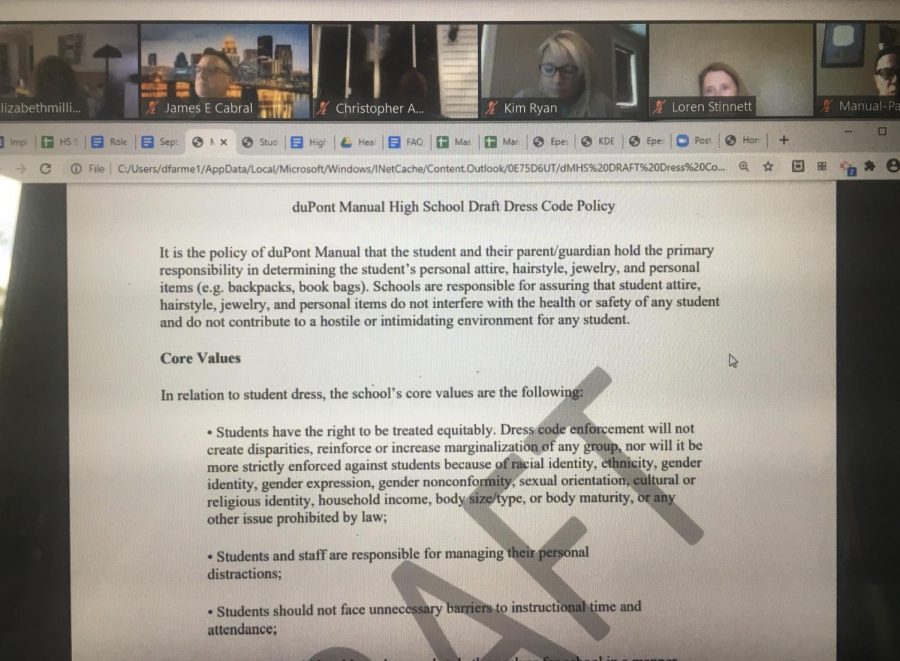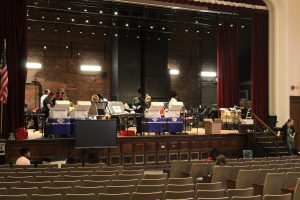September SBDM meeting reviews homework and dress code policies
September 26, 2020
Manual’s September virtual SBDM meeting commenced at 3:02 p.m.
After approving the last meeting’s minutes and August expenditures of both Manual and YPAS, the SBDM board has moved on discussing the 5th day Count. Manual has 1,925 students enrolled, which is up in enrollment. This gives the budget $90,000 which is equivalent to 1 1/2 teacher.
— Manual RedEye (@manualredeye) September 24, 2020
First, the August meeting minutes were approved, immediately followed by a review of the Manual and YPAS August expenditures. The expenditures showcase the account activity and overall financial report for all Manual and YPAS clubs and activities. Both reports were approved by the SBDM council.
Next, the 5th day count was explained by Principal Darryl Farmer.
“We had an enrollment of 1,925 students for this school year, which is up enrollment by around 30 students. When the enrollment goes up, it now matches the budget application given to us,” Farmer said.
DuPont Manual High School was one and a half teachers over-budget in the 2019-2020 school year, in terms of salary. Due to an increase in enrollment, and therefore in budget, there are now expenditures to pay for this. The 5th day count will pay for and cover all teachers at Manual.
Afterwards, the School Report Card for Manual and YPAS was reviewed and accepted by the SBDM council. The School Report Card is created by the Kentucky Department of Education and is split into four categories, showing what classes are taught and how many students are enrolled in those classes. The four categories include Visual and Performing Arts, Health Education and Physical Education, World Languages and Career and Technical Education.
In addition to the acceptance, members were instructed to print the acceptance signature page, sign and drop it off at school on September 25.
Next on the agenda is a review of the Homework Policy. Mr. Brian Hinds (YPAS) is presenting the following: pic.twitter.com/vVWFIhM9Ti
— Manual RedEye (@manualredeye) September 24, 2020
Next, the Homework Policy was reviewed. This was a REAP policy from last meeting that Brian Hinds motioned to alter, inserting new language that was reflective of NTI.
“After chatting with my freshman today… about how they were feeling about things in general, Louisville and elsewhere, they spoke of homework frustrations.. They feel like they’ve been cast into the ocean to self-teach a lot of material without a lot of support they would most benefit from,” Hinds said.
The council had a few concerns regarding Hinds’ altercations, such as that his language wouldn’t work well for in-person classes and that teachers would actually be more restricted on what they could assign.
“If you’re going to do flipped classroom, a lot of it is to learn a lot of it at home and then come to class and we try to figure it out,” Alesia Williams said. She proposed a new statement for the policy, “Homework should not be assessed for mastery until the homework has been reviewed as part of the learning process.”
The board has motioned to write out new additions to the policy including the definition of feedback, NTI specific guidelines, and more. The board will then review this at the next meeting.
— Manual RedEye (@manualredeye) September 24, 2020
The council came to a consensus that new additions to the policy would be written and reviewed next meeting. This would include a definition of what feedback is and NTI specific guidelines.
Next on the agenda is a review of the Dress Code policy. Ms. Robin Weiss is now presenting a draft of the policy created by board members on September 22nd.
— Manual RedEye (@manualredeye) September 24, 2020
The last item on the agenda, the dress code policy, was then addressed. Like the Homework Policy, the Dress Code policy was another REAP sent to be re-written and reviewed. Robin Elise Weiss, Kim Ryan and Brain Hinds were in charge of creating a new policy based on suggestions from the community and JCPS’ Culture and Climate Committee.
The SBDM council members sent their draft to JCPS Inclusion and Diversity staff as well as to Marian Vasser, the Director of Diversity Education and Inclusive Excellence at the University of Louisville. Both parties told the council members that their draft would pass the REAP test.
“This [Dress Code Policy] has been notoriously misogynistic and inequitable to a lot of people so we wanted to go over it with a fine-toothed comb before submitting anything,” Weiss said.
“We have to change the way we think about dress code because historically dress codes have been both sexist and racist…we have to think about instructional time, safety and equity,” Williams said.
The original Dress Code Policy draft can be viewed here. The policy lists core values, stating that all students have the right to be treated equitably, students and staff are responsible for managing their personal distractions, students shouldn’t face unnecessary barriers to instructional time and attendance, students should be able to dress without fear of unnecessary discipline or body shaming and that teachers should focus on teaching without the burden of dress code enforcement. A universal dress code was made, requiring students to wear a top, a bottom and footwear. Minor limitations still do apply, however reflect an equitable stance.
Farmer brought up two main issues he felt needed to be addressed—the consequences students would face for violating the policy and the wearing of hoods.
“I don’t want to worry about dress code. But unfortunately we have students who come in and try to get away with anything they can,” Farmer said. He also added that, “We have no way to identify students with their hoods up.”
In response, the board motioned to replace part of the consequence section with the phrase, “Violations would adhere to the Student Support Behavior Handbook,” in order to be consistent with rule enforcement. The section discussing hoods was replaced to the following, “In the classroom, sweatshirts with hoods worn up are allowed as long as the face is visible to school staff at all times. Hoods must be down in the hallways.”
A few more changes were made in regards to the strength of diction used and that no student should be referred to as a “distraction.”
See the new addition proposed by Weiss here: pic.twitter.com/PDH7MSJBdA
— Manual RedEye (@manualredeye) September 24, 2020
Here are the final changes made today to the dress code policy. The board motions to vote on this as a first read. pic.twitter.com/nu9Yg9CVVA
— Manual RedEye (@manualredeye) September 24, 2020
A motion was made by Weiss to vote on the new draft as a first read. The motion was accepted and the new copy will be sent out with highlights in red showcasing the changes made during the meeting. The policy will be reviewed again at the next meeting for a second read.
The meeting adjourned at 4:47 p.m.









